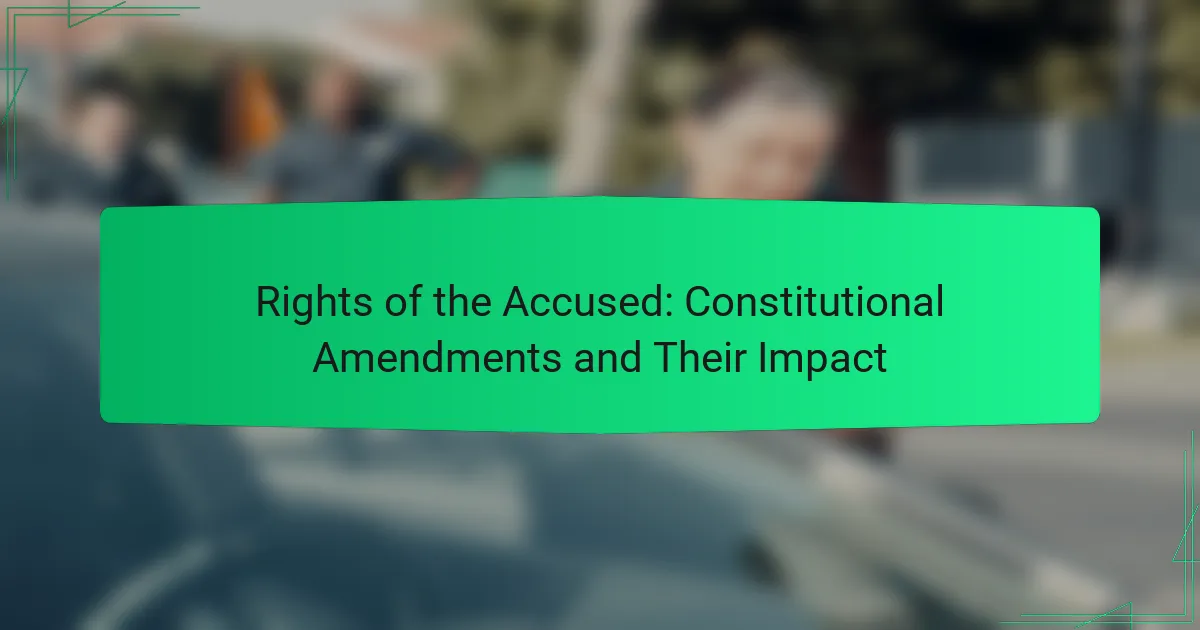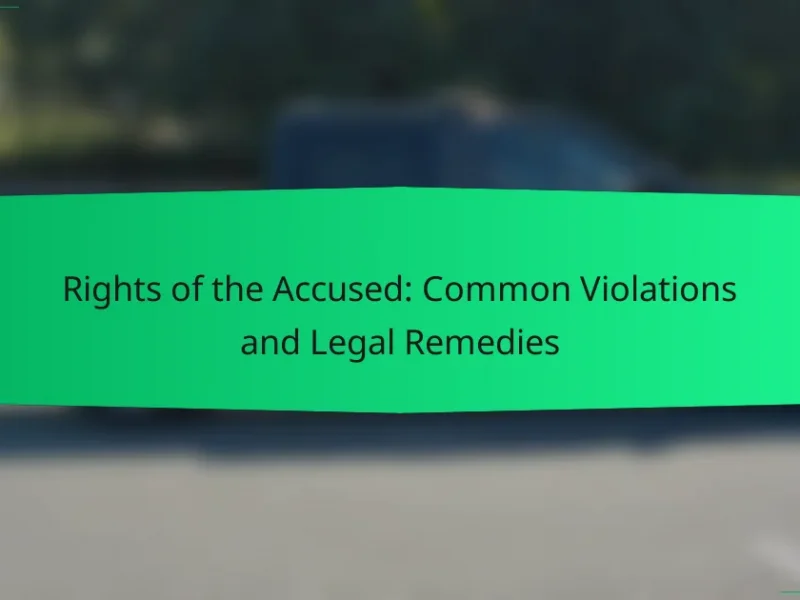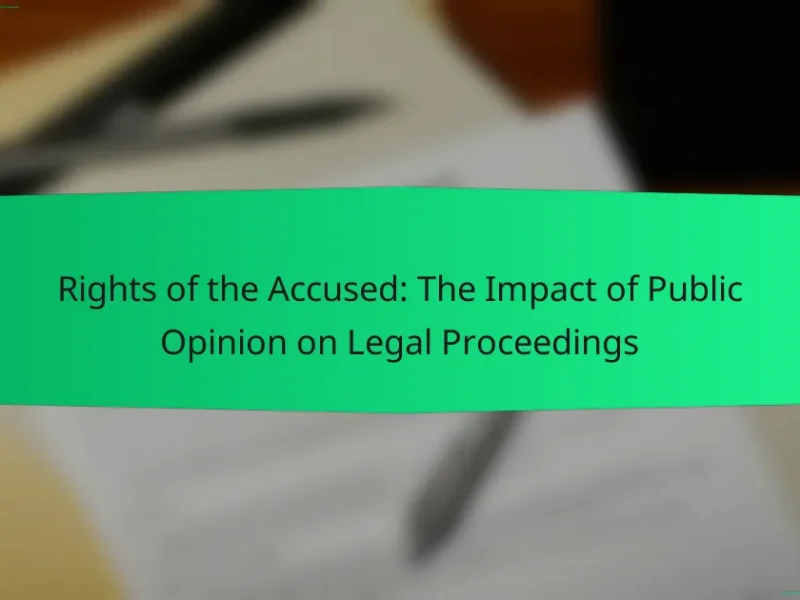The rights of the accused under Constitutional Amendments are fundamental protections designed to ensure justice and prevent wrongful convictions. Key amendments include the Fourth Amendment, which protects against unreasonable searches and seizures; the Fifth Amendment, which guarantees the right to due process and protects against self-incrimination and double jeopardy; the Sixth Amendment, which ensures the right to a fair trial, legal counsel, and an impartial jury; and the Eighth Amendment, which prohibits excessive bail and cruel and unusual punishment. Over time, landmark court decisions, such as Gideon v. Wainwright and Miranda v. Arizona, have further defined and expanded these rights, highlighting the evolving nature of legal protections for individuals accused of crimes. This article examines these constitutional amendments and their significant impact on the rights of the accused within the legal system.
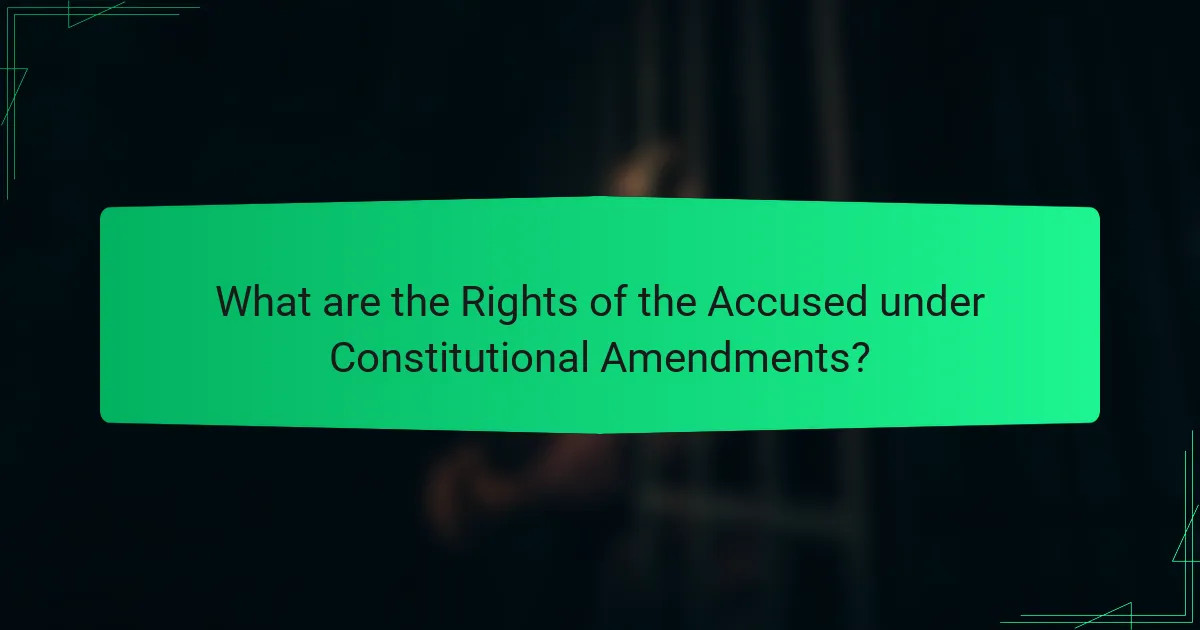
What are the Rights of the Accused under Constitutional Amendments?
The rights of the accused under Constitutional Amendments include the right to a fair trial, the right to remain silent, and the right to legal counsel. The Sixth Amendment guarantees the accused the right to a speedy and public trial by an impartial jury. It also ensures the right to be informed of the nature and cause of the accusation. The Fifth Amendment protects against self-incrimination and double jeopardy. The Eighth Amendment prohibits excessive bail and cruel and unusual punishment. These rights are fundamental to ensuring justice and protecting individuals from wrongful convictions.
How do these rights protect individuals in the legal system?
These rights protect individuals in the legal system by ensuring fair treatment and due process. They guarantee that accused persons receive legal representation and the right to a fair trial. The Sixth Amendment, for example, provides the right to counsel. This ensures that defendants have legal guidance, which is crucial for navigating complex legal proceedings. The Fifth Amendment protects against self-incrimination, allowing individuals to remain silent. This prevents coerced confessions and promotes justice. Additionally, the Fourteenth Amendment mandates equal protection under the law. This means that all individuals, regardless of background, are entitled to the same legal rights and protections. Collectively, these rights uphold the integrity of the legal system and safeguard individual freedoms.
What specific amendments address the rights of the accused?
The specific amendments that address the rights of the accused are the Fourth, Fifth, Sixth, and Eighth Amendments. The Fourth Amendment protects against unreasonable searches and seizures. The Fifth Amendment guarantees the right to due process and prohibits self-incrimination and double jeopardy. The Sixth Amendment ensures the right to a speedy trial, an impartial jury, and legal counsel. The Eighth Amendment protects against excessive bail, fines, and cruel and unusual punishment. These amendments collectively establish critical protections for individuals accused of crimes in the United States.
How do these rights vary across different jurisdictions?
Rights of the accused vary significantly across different jurisdictions. Each jurisdiction has its own legal framework and interpretations of constitutional amendments. For example, the right to a speedy trial is guaranteed by the Sixth Amendment in the United States. However, states may have different timelines and procedures for what constitutes “speedy.”
In some countries, like Canada, the principles of fair trial rights are enshrined in the Canadian Charter of Rights and Freedoms. This can lead to different standards for evidence admissibility compared to U.S. courts. Additionally, in jurisdictions with civil law systems, such as France, the rights of the accused may be governed by codes rather than constitutional amendments.
The application of these rights can also be influenced by local laws and judicial interpretations. For instance, the right to remain silent may be upheld differently in various states or countries. Historical context, such as past legal precedents, also shapes the rights of the accused in each jurisdiction. Therefore, understanding these variations requires examining specific laws and legal practices within each area.
Why are these rights essential for a fair trial?
These rights are essential for a fair trial because they ensure justice and protect individuals from abuse. The right to counsel allows defendants to receive legal guidance. This is crucial in navigating complex legal systems. The right to a public trial prevents secret proceedings that could lead to unfair outcomes. The right to an impartial jury ensures that verdicts are based on facts, not biases. Additionally, the right to confront witnesses supports the ability to challenge evidence. According to the Sixth Amendment of the U.S. Constitution, these rights are fundamental to maintaining the integrity of the judicial process. Historical cases, such as Gideon v. Wainwright, demonstrate the importance of legal representation in achieving fair trials.
What role do these rights play in preventing wrongful convictions?
Rights of the accused play a crucial role in preventing wrongful convictions. These rights ensure fair treatment within the legal system. The Sixth Amendment guarantees the right to a fair trial, which includes an impartial jury and adequate legal representation. This representation helps to challenge evidence and procedural errors that could lead to wrongful convictions. The Fifth Amendment protects against self-incrimination, preventing coerced confessions that may be unreliable. Additionally, the Fourth Amendment safeguards against unreasonable searches and seizures, ensuring that evidence is obtained lawfully. Studies show that wrongful convictions are often linked to inadequate defense or prosecutorial misconduct. By upholding these rights, the legal system promotes justice and reduces the risk of innocent individuals being convicted.
How do these rights ensure due process in legal proceedings?
These rights ensure due process in legal proceedings by providing protections to individuals accused of crimes. The Sixth Amendment guarantees the right to a fair trial, including the right to legal counsel. This ensures that defendants have access to legal representation, which is crucial for navigating complex legal systems.
Additionally, the Fourteenth Amendment’s Due Process Clause mandates that states provide fair procedures before depriving individuals of life, liberty, or property. This clause protects against arbitrary actions by the state and requires that legal proceedings follow established rules and guidelines.
Moreover, the right to confront witnesses and present a defense is fundamental to due process. These rights collectively safeguard against wrongful convictions and ensure that trials are conducted fairly. Historical cases, such as Gideon v. Wainwright, highlight the importance of these rights in upholding justice and fairness in the legal system.
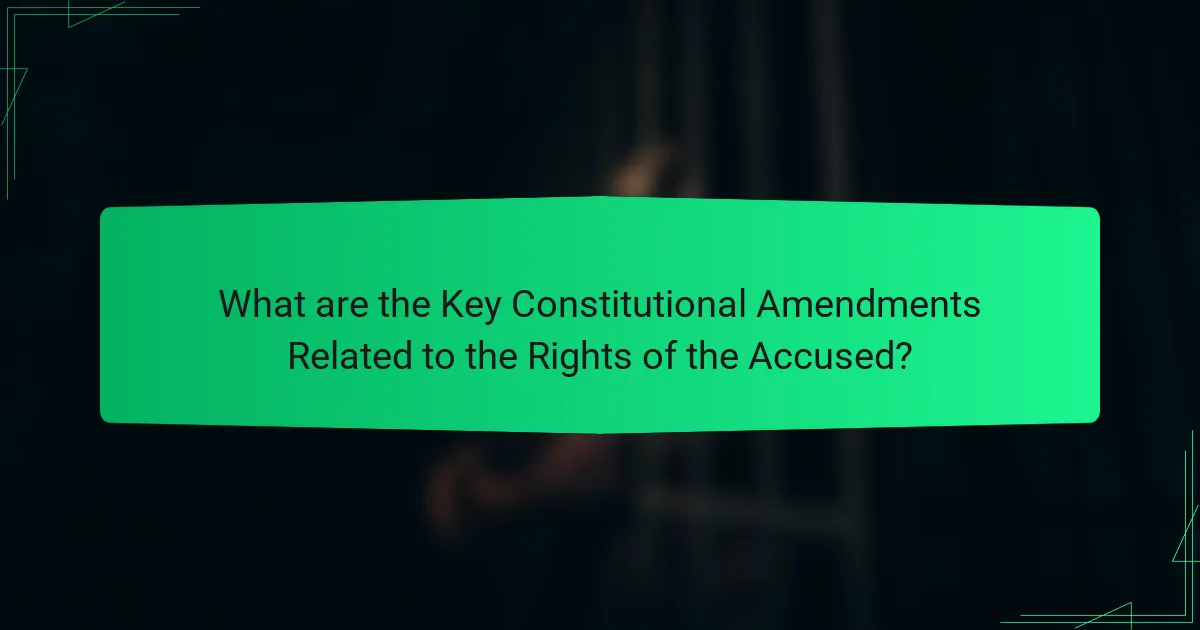
What are the Key Constitutional Amendments Related to the Rights of the Accused?
The key constitutional amendments related to the rights of the accused are the Fourth, Fifth, Sixth, and Eighth Amendments. The Fourth Amendment protects against unreasonable searches and seizures. This amendment requires law enforcement to obtain a warrant based on probable cause. The Fifth Amendment ensures the right to due process and protects against self-incrimination. It also includes the double jeopardy clause, preventing an individual from being tried twice for the same offense. The Sixth Amendment guarantees the right to a fair and speedy trial. It includes the right to counsel and the right to confront witnesses. The Eighth Amendment prohibits excessive bail and cruel and unusual punishment. These amendments collectively safeguard the legal rights of individuals accused of crimes.
What does the Sixth Amendment guarantee for the accused?
The Sixth Amendment guarantees the accused the right to a fair trial. This includes the right to a speedy trial, an impartial jury, and legal counsel. The accused also has the right to be informed of the charges against them. Additionally, they can confront witnesses and obtain witnesses in their favor. These rights are fundamental to ensuring justice in the legal system. The Sixth Amendment is part of the Bill of Rights, ratified in 1791. It aims to protect individuals from unfair prosecution and ensure due process.
How does the right to counsel impact the legal process?
The right to counsel significantly impacts the legal process by ensuring defendants receive legal representation. This representation helps to uphold the principle of fair trial, as established in the Sixth Amendment of the U.S. Constitution. Legal counsel assists in navigating complex legal systems and procedures. Defendants with counsel are more likely to understand their rights and the charges against them. Studies show that represented defendants often achieve better outcomes in court. For instance, a report by the Bureau of Justice Statistics indicates that those with legal representation are less likely to be convicted. Additionally, the presence of counsel can lead to more informed plea negotiations. Overall, the right to counsel is crucial for maintaining justice and equity in legal proceedings.
What are the implications of the right to a speedy trial?
The right to a speedy trial ensures that defendants are tried without unnecessary delays. This right is crucial for protecting the accused from prolonged incarceration before trial. It helps maintain the integrity of the judicial process by preventing the deterioration of evidence over time. The Sixth Amendment of the U.S. Constitution guarantees this right, which has been upheld in various court rulings. Delays in trials can lead to increased stress and anxiety for the accused. They can also affect the ability of defendants to mount an effective defense. Additionally, a speedy trial can enhance public confidence in the legal system. Overall, the implications of this right are significant for both individual defendants and the justice system as a whole.
What protections does the Fourth Amendment provide?
The Fourth Amendment provides protections against unreasonable searches and seizures. It requires law enforcement to obtain a warrant based on probable cause before conducting searches. This amendment safeguards individuals’ privacy and property rights. It aims to prevent arbitrary governmental intrusions. The historical context includes a response to British practices before the American Revolution. This amendment is fundamental in upholding civil liberties. Courts have interpreted it to apply to both physical and electronic searches. Violations of the Fourth Amendment can lead to evidence being excluded in court.
How does the exclusionary rule safeguard the rights of the accused?
The exclusionary rule safeguards the rights of the accused by preventing illegally obtained evidence from being used in court. This rule is rooted in the Fourth Amendment, which protects against unreasonable searches and seizures. By excluding such evidence, the rule discourages law enforcement from violating constitutional rights. It ensures that the judicial process remains fair and just. Without this rule, individuals could face convictions based on evidence obtained through unlawful means. The rule reinforces the principle that the ends do not justify the means in legal proceedings. Courts have upheld this rule in landmark cases, such as Mapp v. Ohio (1961). In this case, the U.S. Supreme Court ruled that evidence obtained without a warrant could not be used in state courts.
What constitutes an unreasonable search or seizure?
An unreasonable search or seizure occurs when law enforcement violates the Fourth Amendment of the U.S. Constitution. This amendment protects individuals from arbitrary governmental intrusions. A search or seizure is deemed unreasonable if it lacks probable cause or a warrant. Probable cause requires a reasonable belief that a crime has occurred or will occur. A warrant must be issued by a judge based on evidence presented. Exceptions exist, such as exigent circumstances or consent. However, these exceptions must be clearly justified. Historical context shows that unreasonable searches often lead to violations of personal privacy. The exclusionary rule prevents evidence obtained through unreasonable searches from being used in court.
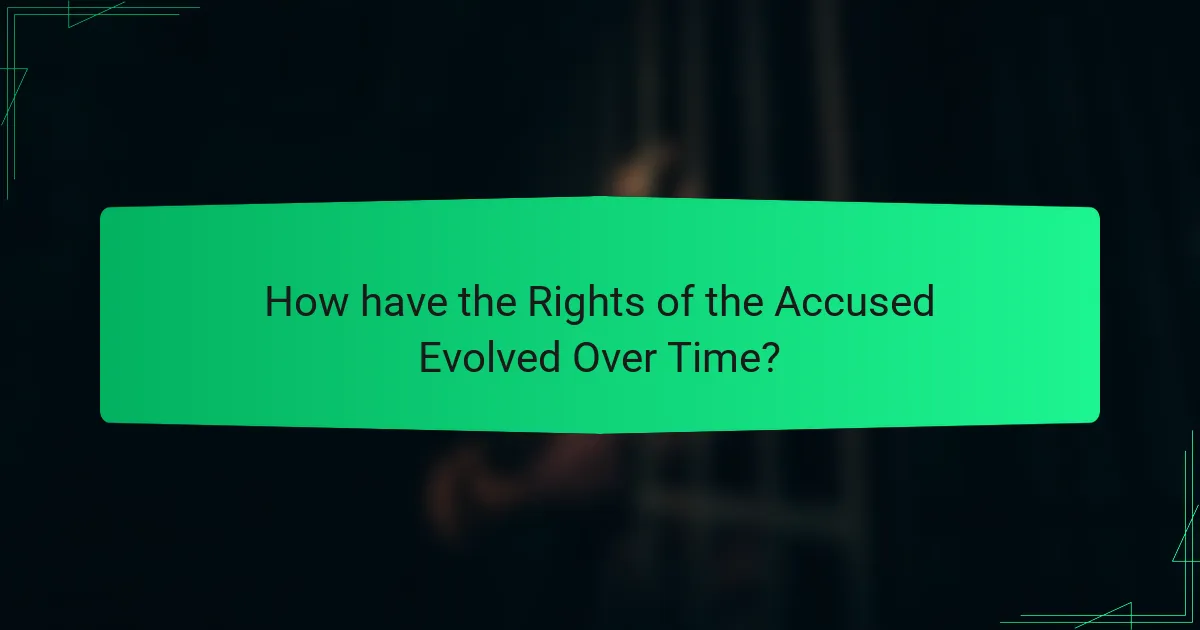
How have the Rights of the Accused Evolved Over Time?
The rights of the accused have evolved significantly over time through various legal amendments and landmark court decisions. Initially, the Bill of Rights established basic protections, such as the Sixth Amendment, which guarantees the right to a fair trial. Over the years, the interpretation of these rights has expanded. For example, the Supreme Court case Gideon v. Wainwright in 1963 mandated that states provide counsel to defendants who cannot afford an attorney. This decision reinforced the right to legal representation. Additionally, the Miranda v. Arizona ruling in 1966 established the requirement for law enforcement to inform suspects of their rights during arrest. These developments illustrate a growing recognition of the need to protect the rights of individuals within the legal system. As society has progressed, so too have the mechanisms to ensure fairness and justice for the accused.
What landmark Supreme Court cases have shaped these rights?
Landmark Supreme Court cases that have shaped the rights of the accused include Miranda v. Arizona, Gideon v. Wainwright, and Mapp v. Ohio. Miranda v. Arizona established the requirement for law enforcement to inform suspects of their rights during arrest. This case emphasized the necessity of the right to counsel and the right against self-incrimination. Gideon v. Wainwright ruled that the Sixth Amendment guarantees the right to an attorney for defendants unable to afford one. This decision extended the right to free legal counsel in state courts. Mapp v. Ohio established the exclusionary rule, which prevents illegally obtained evidence from being used in court. These cases collectively reinforced the protections afforded to individuals accused of crimes under the Constitution.
How did Miranda v. Arizona influence the rights of the accused?
Miranda v. Arizona established the requirement for law enforcement to inform individuals of their rights upon arrest. This ruling specifically mandated that suspects be informed of their right to remain silent and their right to an attorney. The decision aimed to protect the Fifth Amendment right against self-incrimination. It also reinforced the Sixth Amendment right to counsel. Following this case, any statements made by a suspect during interrogation could be deemed inadmissible in court if these rights were not communicated. This landmark ruling significantly enhanced the protection of the accused in the criminal justice system. The influence of Miranda v. Arizona continues to shape police procedures and the treatment of suspects today.
What impact did Gideon v. Wainwright have on legal representation?
Gideon v. Wainwright established the right to free legal counsel for defendants in criminal cases. This landmark Supreme Court decision mandated that states provide attorneys for those who cannot afford one. Prior to this ruling, many defendants faced trials without legal representation. The case emphasized that the right to counsel is fundamental to a fair trial. This decision reinforced the Sixth Amendment, extending its protections to state courts. As a result, legal representation became more accessible for indigent defendants nationwide. The ruling has led to significant changes in public defense systems across various states. Overall, Gideon v. Wainwright transformed the landscape of legal representation in the United States.
What are the contemporary challenges to the rights of the accused?
Contemporary challenges to the rights of the accused include issues like wrongful convictions, inadequate legal representation, and biased judicial processes. Wrongful convictions can occur due to unreliable witness testimony or flawed forensic evidence. Inadequate legal representation often results from underfunded public defense systems. Biased judicial processes can stem from systemic racism and socioeconomic disparities. Additionally, the rise of technology has led to concerns over privacy rights and surveillance. The use of artificial intelligence in decision-making can also introduce bias. These challenges undermine the fundamental principles of fair trial and due process.
How have recent legal changes affected these rights?
Recent legal changes have significantly impacted the rights of the accused. For instance, the implementation of criminal justice reforms has enhanced protections against wrongful convictions. Changes in evidence rules have made it easier for defendants to challenge inadmissible evidence. Additionally, new legislation has expanded access to legal representation for low-income individuals. These updates aim to ensure fair trials and uphold due process rights. Research indicates that jurisdictions adopting these reforms have seen a reduction in pretrial detention rates. Overall, these changes reflect a commitment to improving the legal framework surrounding the rights of the accused.
What role does public opinion play in shaping the rights of the accused?
Public opinion significantly influences the rights of the accused. It shapes legislative actions and judicial decisions. When the public advocates for specific rights, lawmakers often respond. This reaction can lead to amendments or reforms in legal protections. Historical events illustrate this impact. For example, the civil rights movement raised awareness about the rights of individuals facing charges. Public outcry led to changes in laws that protect against discrimination. Additionally, media coverage can sway public sentiment. This, in turn, pressures authorities to uphold or expand rights. Overall, public opinion acts as a catalyst for change in the legal landscape surrounding the accused.
What best practices can individuals follow to protect their rights during legal proceedings?
Individuals can protect their rights during legal proceedings by being aware of their legal rights and seeking legal counsel. Understanding the right to remain silent is crucial. This right prevents self-incrimination during questioning. Individuals should also be informed about their right to an attorney. This right ensures legal representation during trials and interrogations.
Maintaining accurate records of all interactions with law enforcement is advisable. Documentation can provide evidence in case of rights violations. Individuals should also assert their rights clearly when they feel they are being infringed upon. This can help prevent coercive tactics from being used.
Familiarizing oneself with relevant constitutional amendments is beneficial. For example, the Sixth Amendment guarantees the right to a fair trial. This includes the right to an impartial jury. Lastly, individuals should avoid discussing their case publicly. Public statements can affect the outcome and their legal standing.
The main entity of the article is the rights of the accused as outlined by Constitutional Amendments. This article provides a comprehensive overview of the critical protections afforded to individuals accused of crimes, including the right to a fair trial, legal counsel, and protection against self-incrimination. It examines specific amendments such as the Fourth, Fifth, Sixth, and Eighth Amendments, detailing how they safeguard due process and prevent wrongful convictions. Additionally, the article discusses the evolution of these rights over time, landmark Supreme Court cases that have shaped them, contemporary challenges, and best practices for individuals to protect their rights during legal proceedings.
